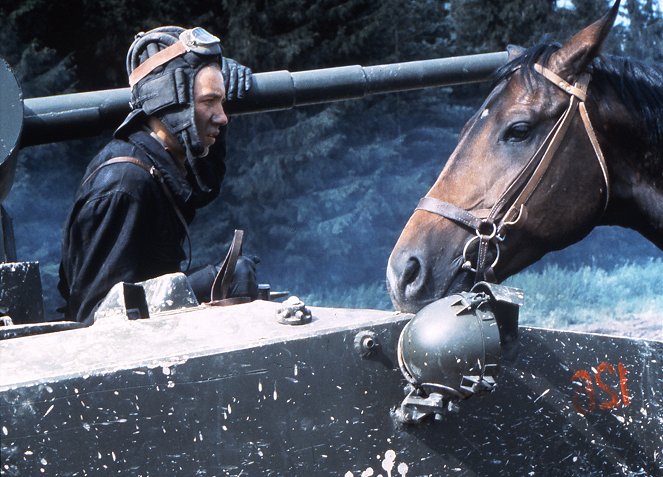Regie:
Nikita MichalkowKamera:
Vilen KalyutaBesetzung:
Oleg Menshikov, Nikita Michalkow, Ingeborga Dapkunaite, Nadezhda Mikhalkova, Vjačeslav Tichonov, Svetlana Kryuchkova, Vladimir Ilyin (mehr)Inhalte(1)
Ein langer Sommertag auf dem Lande, im Jahre 1936. Dimitri, der elegante Geheimagent, besucht die schöne Maroussia, seine einstige Jugendliebe. Diese ist inzwischen mit Sergej verheiratet, dem legendären Bürgerkriegsgeneral, mit dem sie eine gemeinsame Tochter hat. Ein verdeckter, zäher Kampf um Liebe und Rache, Eifersucht und Politik entwickelt sich zwischen den Dreien an einem heißen Tag. (Verleiher-Text)
(mehr)Kritiken (7)
In the end, a brilliant indictment of the Stalinist purges in the Soviet army of the late 1930s. At the beginning the film deceives with its body, Michalkov lulls the viewer with a plethora of humorous situations and the depiction of Colonel Kotov's idyllic family life, only to grab them by the throat at the end and strangle them with a demonstration of the practices of NKVD agents. Michalkov and Imbragimbek's film is both kind and terrifying, and the Oscar is in the right hands. And what I would also like to highlight are the performances of all the actors involved, especially Michalkov himself and his real daughter Nadezhda, who is absolutely disarming with her immediacy, as if standing in front of the camera is the easiest thing in the world.
()
Michalkov's adept storytelling art, skillfully used within his capabilities, with a determined ambition to unveil the aura of mystery surrounding one of the many dark actions of Stalin's regime, is unquestionable. The unusually used form of probing into an officer's family compels the viewer to ponder the prevailing situation everywhere. However, the two-and-a-quarter-hour narration through the most tedious possible form, consisting of long dialogue-heavy scenes that (perhaps) lead to "something" progressing the plot, occasionally deviates from its original intention of delivering a certain dose of epicness, which was meant to contrast with the minimalist casting of the family circle. Despite the intentional slow pacing, the film leaves something behind in the viewer after it ends, automatically resonating on a deeper level. And that "something" is not a pleasant thing to think about, even though that was Nikita's point.
()
Ein Film, in dem die Poetik "Des Kirschgartens" (von Anton Tschechow) auf die Poetik des sozialistischen Realismus trifft. Die Poetik der alten friedlichen bürgerlichen Welt auf die chaotische und bizarre neue Ordnung der stalinistischen Linie. Vor der friedlichen Kulisse der sowjetischen Landschaft, im chaotischen Rhythmus einer traditionellen russischen Familie, entfaltet sich eine zunächst subtile, dann aber überaus packende Geschichte von Rache und Gewissen. Die Geschichte eines Mannes im Fleischwolf der Geschichte, eines Mannes, der von der Sonne der Revolution versengt (nicht müde!) wurde. Zweifellos spiegelt die Kammergeschichte, wie auch das jugoslawische Kino, metaphorisch die Welt der stalinistischen UdSSR wider (d. h. eine Welt, die von der Ideologie geprägt und verführt wurde). Er spiegelt sie mit einer Suggestivität wieder, die fast beängstigend ist, aber durch die ersten schockierenden Aufnahmen nicht erzwungen wird. Gleichzeitig spielt Michalkow die ungewöhnlich reinen und glaubwürdigen Töne der Romanze aus, die von der unglaublich charismatischen Darstellung des Regisseurs selbst und vor allem seiner Tochter Nadeschda dominiert wird. Ihre Harmonie ist absolut, schön, unbeschreiblich. Das Drama eines Mannes, der an die Religion der neuen Ordnung glaubt, an die Utopie eines schönen Morgens, und ihr dann selbst zum Opfer fällt, ist oberflächlich gesehen etwas bürgerlich Harmonisches, darunter aber ein spannendes Drama. Auch Oleg Menschikow gibt eine fantastische Vorstellung, seine Studie eines innerlich zerrissenen Mannes hat eine lesbare Struktur und eine enorme innere Dynamik. Michalkows Gespür für die Komposition des Bildes ist absolut, für den Wechsel von friedlichen Szenen einer alten russischen Familie und den fast komisch anmutenden Einbrüchen des Sozialismus in das Leben der Menschen. Die Leitmotive Kugelblitz und Wanderer umrahmen die präzise Komposition und geben ihr einen regelmäßigen Rhythmus und einen Hauch von Absurdität. Die Konstruktion des stalinistischen Ballons symbolisiert dann die ewige Präsenz eines Anführers in den alltäglichen Freuden und Sorgen. Das namensgebende Lied, das mit seiner Melancholie Tränen in die Augen treibt, darf nicht unerwähnt bleiben. Michalkows Schilderung des stalinistischen Regimes ist daher so wirkungsvoll, so unmittelbar, dass es sich nicht um eine Anklage an sich handelt, sondern um eine parteiische Schilderung des Schicksals des Volkes. Menschen, deren Leben von dem phantomhaften Anführer eines Sechstels der Welt in Schutt und Asche gelegt wurde.
()
When I first saw the film 20 years ago, it deeply impressed me and I gave it the highest rating. However, repetition is the mother of wisdom, and today I have different standards, and so I noticed some flaws I missed the first time. The film is overly drawn out and could benefit from more prominent editing. Shortening the film by 20 minutes would definitely not mean depriving the viewer of anything essential, especially in the middle part where the drama really gets drowned in dialogues. Once I thought that Michalkov was playing with the viewer and keeping them in suspense for a very long time, yet now it seems to me that he reveals unnecessarily too much and that the film could have been better treated dramaturgically to deliver a sudden blow, so to speak. Also, Michalkov's fondness for melodrama and sentiment is occasionally excessive, although these are minor flaws in its beauty. Finally, in retrospect, Michalkov's political views are also evident here, which would fit perfectly into the era of perestroika, as a kind of critique of Stalinist excesses, without touching the legendary legacy of the Bolshevik revolution and questioning traditional Russian authoritarianism. On the other hand, the acting trio of Menshikov, Michalkov, and little Nadezhda Mikhalkova constantly keep the film above average. Michalkov also knows how to create beautiful images of the era's society, and in the last third, when the NKVD comes into play, the film gains a truly chilling atmosphere. For Russian society, where Stalin still represents an unquestioned authority and the symbol of the Russian empire, this is a much-needed film with a strong artistic statement about the cruelty of the time, despite my aforementioned reservations. Overall impression: 85%.
()
This film won me over years ago. What I enjoy most about it is the brutal contrast of the relaxed summer idyll with the harsh reality of Stalin's purges, the perfect atmosphere, and the three outstanding performances by Oleg Menshikov, Nikita Mikhalkov, and Nadezhda Mikhalkova. I've said many times how I feel about children in film, but Nadia gave a truly excellent performance as Nadia, albeit mightily supported by her daddy/co-actor/director/screenwriter.
()
Even though the film has a slow pace, you definitely don't feel like nothing is happening. It's as if it's all heading towards something big, and given the peaceful development, you'll get the feeling that that something big won't be very pleasant. It beautifully captures human nature and human qualities, but also landscape and tranquility in contrast to something lurking in the background.
()
When I first saw the film in the 1990s, it had a profound effect on me. Today, however, I am a little disappointed with it. I'm not saying it's a bad movie, but it's not worthy of the adoration I felt at the time. Nevertheless, I think it is one of the key works of Russian cinema, so it is worth paying attention to. In particular, I never cease to be fascinated by the alarming contrast between the carefully drawn rural idyll full of poetry and the final dramatic sequence of events. (85%)
()

